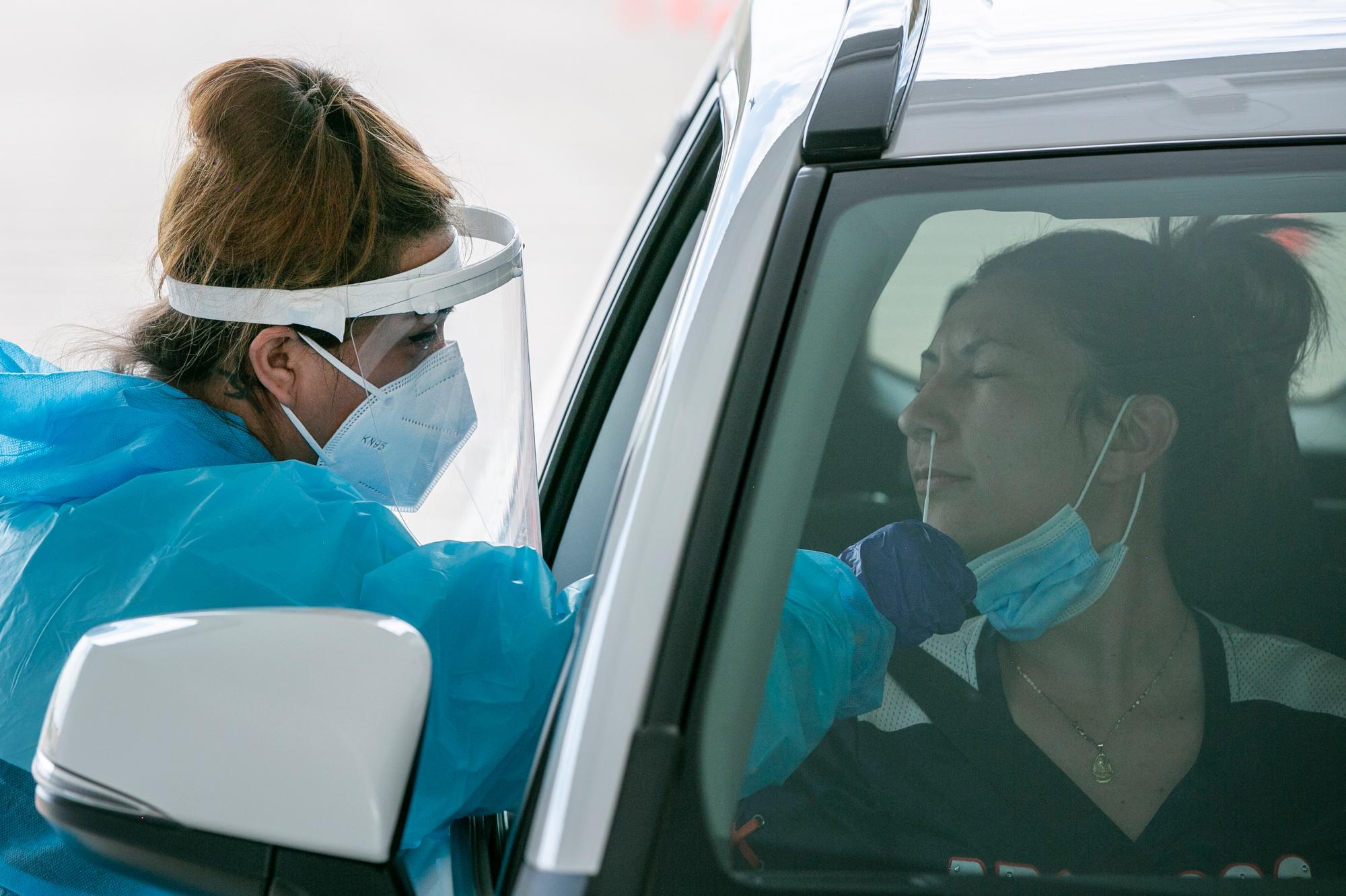
Updated 6:42 p.m.
With the omicron wave piling on a slew of fresh coronavirus cases at a rapid clip, Colorado blew through the 1 million case threshold Monday, according to the state’s COVID-19 dashboard.
On Friday, the most recent day with data, the state health department reported 989,409 cases. By Monday, with more than 50,000 new cases recorded over the weekend, that figure hit 1,040,510.
“Grim milestone,” said Elizabeth Carlton, an associate professor for the school at the CU Anschutz Medical Campus and member of the Colorado COVID-19 Modeling Team that provides epidemiological modeling for the state. “March of 2020 was terrifying and this wave right now is scary in its own way. But we have vaccines, we have better treatment. The prognosis is better if people do get infected. I mean, it is obviously still this very serious disease you have to deal with, but it is not the same as March of 2020.”
“It's sad to me,” said Dr. Anuj Mehta, a pulmonary critical care physician with Denver Health. Since the first cases arrived in the United States about two years ago, scientists have developed tools to manage the pandemic, such as wearing a mask and getting COVID-19 vaccinations. “They're easy. They're not a big deal. And the fact that there's still so much reluctance to do those basic things, I find to be really sad,” Mehta said. “Because I think we were together on this as a community in March of 2020, and that very quickly fell apart.”
COVID-19 officially arrived in Colorado March 5, 2020, after first being discovered in China weeks earlier and then around the globe not long after. That day Colorado health officials announced the state had its first two presumptive positive cases. The first patient identified was an out-of-state visitor to Summit County, a male in his 30s, who went into isolation in Jefferson County. The second, unrelated, case was in an elderly woman from Douglas County. She’d traveled abroad on an international cruise and came back to Colorado.
By that date, the novel coronavirus had killed 12 people in the United and spread to at least 19 states. It was found in more than 75 countries. Worldwide, it had infected more than 90,000 people, killing more than 3,000.
Fast forward to today, the world has recorded more than 305 million cases and 5 million deaths, according to the World Health Organization. The U.S. has recorded more than 60 million cases and 835,000 deaths, according to the Centers for Disease Control and Prevention. Along with Colorado’s now more than one million cases, 52,450 Colorado residents have been hospitalized and 10,902 Coloradans have died due to COVID-19, according to the state’s coronavirus dashboard.
The first Colorado fatality came March 13, about a week after the first cases were identified. The state’s first coronavirus death was identified as an El Paso County woman in her 80s who died in a Colorado Springs hospital.
The omicron variant hit Colorado during the holiday season, not soon after the delta variant delivered a devastating punch of transmission, cases, hospitalizations and deaths in the fall. The delta wave hit a year after the brutal surge of 2020, which also drove hospitalizations and deaths to record numbers before vaccines became available.
“There's a massive workforce shortage across every sector across the country right now. Omicron is incredibly transmissible,” said Scott Bookman, state’s COVID-19 Incident Commander. “We see people in grocery stores. Workers in the restaurant industry, health care industry, all coming down with COVID and going into isolation.”
A spokesperson for the state health department noted Colorado has the 12th lowest cases per 100,000 people among states. She said with the omicron variant spreading quickly, residents must keep taking steps known to provide protection. Those include getting a three doses of vaccine, which protects against severe symptoms, hospitalization, and death, testing to identify infection early and prevent spread, and masking while indoors.
The landmark comes as Colorado’s seven-day rate of positive tests hit 28.5, the highest level documented during the entire pandemic. A little more than three weeks ago, it was around 6 percent.
The latest COVID-19 variant, omicron, is driving an unprecedented surge of coronavirus cases, in Colorado and nationally, and hospitalizations continue to climb. Public health officials have put out the call for residents to stay up to date on COVID-19 vaccines to limit the pressure on the already heavily strained health care system.
On Monday, the state health department reported 1,402 people hospitalized with confirmed cases. That's up about 400 in the two and a half weeks since Christmas Day.
Carlton is watching closely to see how big the omicron wave is and what that means for hospitalizations and whether hospitals get overrun with COVID patients.
“We've seen this exponential growth in cases. We've also seen rising hospital demand, but the hospital demand has not grown anything like the cases,” she said. “If there's any good news in that, that's the good news. We are hopeful, but we don't know, that the people in the hospital will be less sick and be there for shorter periods of time, as they've been seeing elsewhere around the world.”
Hospital staffing is precariously lean. Fifty-one percent of hospitals say they anticipate a staffing shortage in the next week. As it’s been for weeks, around a third say they anticipate a shortage of intensive care beds.
Related stories
- Colorado reactivates crisis standards for emergency medical services, signaling a worsening situation
- The omicron surge has Colorado schools in for a turbulent start to the new semester
- What the omicron surge means for the vaccinated, the unvaccinated and the state’s hospitals
- How to report an at-home COVID test to Colorado officials
- Is it COVID or a cold? What to do if you feel sick and how to stay safe








